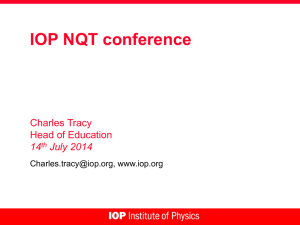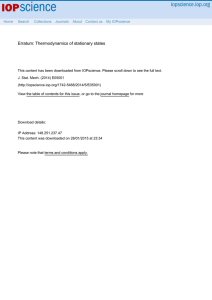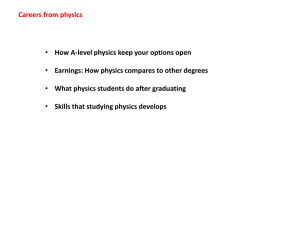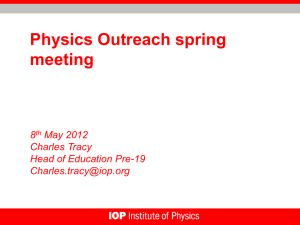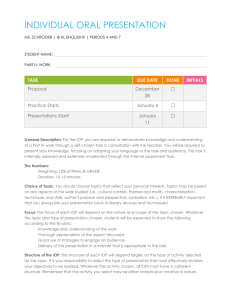IOP Journals
advertisement
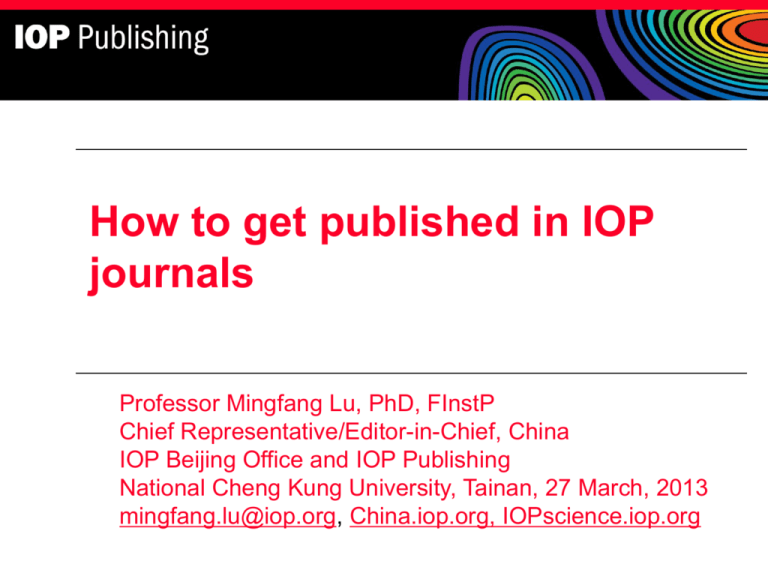
How to get published in IOP journals Professor Mingfang Lu, PhD, FInstP Chief Representative/Editor-in-Chief, China IOP Beijing Office and IOP Publishing National Cheng Kung University, Tainan, 27 March, 2013 mingfang.lu@iop.org, China.iop.org, IOPscience.iop.org Outline Papers and their qualities from Taiwan Quality - IOP criteria What determines your quality Select the journal and submit your paper Process at the journal What referees do for your paper Responding to referees Getting published in IOP Journals Questions Paper Submissions and Publications in IOP from Taiwan Year 2005 2006 2007 2008 2009 2010 2011 2012 Submitted 505 731 881 1,035 1,175 1,078 930 850 Accepted 179 272 303 343 339 303 244 236 Acc rate=Acc/Sub 35.5% 37.2% 34.4% 33.1% 28.9% 28.1% 26.2% 27.8% Papers published in 2012: NTWU/51, NTHU/45, ASinica/40, NCTU/20, NCKU/18, NCU/15, NTUT/8, NTNU/6, TKU/4, FJU/2, CCU/1, CYCU/1, etc. In journals: APJ/32, JMM/31, JPhysD/30, NANO/23, JPCM/13, JCAP/9, Jopt/9, SMS/9, APJL/8, SST/7, JPhysB/5, SUST/5, JPhysA/5, LP, NON, PhyScr, APJS, Jinst, JNE, NJP, NuclFus, PMB, PPCF, AJ, CQG, IP, MST, BF, BMM, RoPP, etc IOP Papers Publications world-wide in 2012 Journals IOP AAS IOP+AAS Taiwan (No 19) Submitted Accepted 34,566 3,911 38,477 (850) 2.5% 13,101 3,524 16,625 (236) 1.8% Acceptance rate 37.9% 90.1% 43.2% 27.8% Other of the Top 10 Countries in 2012 No. 1 USA 2 GER 3 M China Subs 5,064 2,386 7,572 Accs 2,962 1,685 1,453 ACCrate 58.5% 70.6% 19.2% 4 UK 5 FRANCE 6 JAPAN 7 ITALY 8 SPAIN 9 KOREA 10 CANADA 1,984 1,548 1,473 1,327 1,004 1,297 856 1,318 1,017 821 812 545 464 443 66.4% 65.7% 55.7% 61.2% 54.3% 35.8% 51.8% http://IOPscience.iop.org/ QUALITY ASSESSMENT CRITERIA FOR IOP JOURNALS Q1 Makes major contributions to the advancement of the subject world-wide (top 10%) Q2 Good quality work - original and internationally competitive Q3 Borderline work of limited interest Q4 Low quality work - adds little or no new knowledge Q5 Poor work, clearly unsuitable Q1 or Q2 papers are expected Q3 papers unlikely to be accepted Q4 or Q5 papers will be rejected Quality of papers published by authors from Taiwan in 2012 Quality rating Papers accepted Q1 Q1.5 Q2 Q2.5 Q3 Q3.5 Q4-Q5 4 16 196 17 3 0 0 (Total 236) http://IOPscience.iop.org/ Percentage 1.7% 6.8% 83.1% 7.2% 1.2% Accumulated % Q1.5 better 8.5% Q2 better 91.6% Q2.5 better 98.8% What determine your quality Original work, novel and significant Interest to the community Have sound motivation and purpose Not previously published Not under consideration for publication in any other journal or any other form Scientific quality not quantity of papers Ethical code: Research results – true, properly recorded Authorship practices – who can be your coauthors Helpful techniques for writing your paper Focus on new and important research results Make sure the language is clear and precise, especially your conclusions Ensure that figures and tables are clear Ensure that the paper is of the right length Something to avoid Presenting new but trivial or obvious results Making unsubstantiated conclusions Burying new results beneath too much scene-setting Recapping of findings already published Presenting incremental research Being long winded – keep short ‘Flowery’ language Abbreviations and jargon Speculation or anecdotes – keep to the facts A ‘gimmicky’ title makes wild, unjustified claims Poor or incomplete references Poor quality figures Incomplete data Don’t cover up or ‘fudge’ the data More helpful tips Allow time for rewriting Use figures instead of tables Ask a colleague to read and comment on an early draft Check the structure of the paper: Title – proper and complete Abstract – more details, key words, PACS Introduction – history, why, what you have done Method – details and standard Results and Discussion – fact and more Conclusion – what you have achieved References – objective and up-to-date Selecting the journal Choose the right one for you Electronic Submission _Online Online submission For all IOP journals - simple, fast, reliable! More than 98% authors choose to submit online! Online submission _ Online Electronic Submission _ by email For all IOP journals mingfang.lu@iop.org esub@iop.org In the subject line, state, say, Subject: Electronic submission to JPCM Paper as attachment, plus a Cover Letter stating the reasons and the significance of your paper Again, Simple, Fast, and Reliable! Electronic Submission _FAQs Attention: Temporary ID obtained immediately after submission not for status track. Formal ID will be available shortly later Download the PDF file and check carefully. If you find any error there, contact the editor immediately Editors only contact with the Corresponding author! If you are not, check with your corresponding author first No specific templates required by IOP journals – save authors’ time in the submission stage For further check: mingfang.lu@iop.org Process at the journal Via esub@iop.org or Online – temporary ID, but unable to track your paper, e.g. CM/T468752/FTC Editor acknowledges your paper, assign a ref number, e.g. CM/567233/PAP/276041 (Check with your corresponding author first!) Pre-screening process Editor selects referees for the paper Referees send their reports back to the Editor Editor makes decision based on referee reports Adjudicator is selected if the reports are conflicting What referees do for your paper? Independent assessment by experts in the field Referees provide constructive criticism and feedback on your paper A ‘filter’ for scientific quality control Publishing a paper in a peer-reviewed journal gives more credibility to your work than if you post it on your own web site Peer review is an essential part of publishing in a journal or obtaining a grant Referees’ assessment: Scientific Quality Scientific merit: significant new results and originality Accurate and correct Sufficient discussion of the context of the work, and suitable referencing Suitable material for the Journal Referees’ assessment: Presentation Title: is it adequate/appropriate? Abstract: is it complete by itself and suitable for direct inclusion in an abstracting service? Diagrams, tables, and captions: are they clear and essential? Text and mathematics: are they brief but still clear? Conclusion: does it summarise what has been learned and why it is interesting and useful? References: objective and up-to-date Clear writing and communication of ideas, readability and discussion of concepts Introduction to refereeing and Guide for authors Introduction to refereeing http://referees.iop.org http://images.iop.org/referees-chinese/ Introductory guide for authors http://cms.iopscience.org/3205ba4f-d278-11e1-9b7a-4d5160a0f0b4/index.html Responding to referees’ comments Read referees’ report and put away for a day! Read them again! Respond to each and every comment specifically Keep a list of your changes Where you disagree, explain why If referee misses a point it is not necessarily his/her fault Be polite! Prepare a detailed covering letter with your response Usually only one chance for author to respond referees and revise his paper! If your paper is rejected Do not despair: treat referees’ comments as a free expert advice You may be able to re-write your article taking into account the suggestions of the referees and re-submit it Note: If you re-submit the paper to any IOP journal, you need to add enough significant new results in it If you think the review was unfair, appeal to the journal by sending a letter and explaining why you think your work did not receive a fair treatment If your paper is accepted Great - celebrate! The journal will expect you to check your proofs rapidly Nominate another person if you are unavailable Give one copy of proofs to somebody else to read Reply to editor’s queries IOP Flagship Journals Journal of Physics series Journal of Physics – IOP flagship journals range J Phys A: Mathematical & Theoretical (2011 IF: 1.564) 1. Quantum field theory 2. QFT/BEC overlap 3. Quantum information 4. Foundations of quantum mechanics 5. Open quantum open systems 6. Quantum condensed matter physics 7. Computational physics 8. Mathematical methods for materials and biology J Phys B: Atomic, Molecular & Optical Physics (2011 IF: 1.875) 1: Quantum optics and quantum information processing 2: Ultrafast science 3: Cold atoms and molecules 4: Novel light sources for atomic and molecular physics studies Journal of Physics – IOP flagship journals range J Phys CM: Condensed Matter (2011 IF: 2.546) 1. Surface, interface and atomic-scale science 2. Liquids, soft matter and biological physics 3. Nanostructures and nanoelectronics 4. Solid structure and lattice dynamics 5. Electronic structure, 6. Correlated electrons 7. Superconductors and metals, 8. Semiconductors 9. Dielectrics and ferroelectrics, 10. Magnetism and magnetic materials -- All on fundamental CM physics, experimental, theoretical or simulation! J Phys D: Applied Physics (2011 IF: 2.544) 1. Magnetism and magnetic materials 2. Applied interfaces 3. Photonics and semiconductors 4. Spintronics 5. Biomedical optics, biophotonics and biomagnetism 6. Tribology 7. Nanostructures and nanoelectronics 8. Terahertz physics Journal of Physics – IOP flagship journals range J Phys G: Nuclear and Particle Physics (2011 IF: 4.178) 1. Quark Matter / QGP / Relativistic Heavy-Ion Collisions 2. Cosmic Rays & Particle Astrophysics 3. Hadronic Physics 4. Neutrino physics 5. Nuclear Structure 6. Lattice QCD 7. Underground Lab Physics Formula for SCI Impact Factor: A=Papers published in 2009, B=Papers published in 2010 C=Papers (A+B) total citations in 2011 2011 Impact Factor=C/(A+B) As announced by TR/ISI on: 28 June, 2012 All 69 IOP Journals (1-7) Journal of Physics – the flagship journals series (2011 Impact Factor, published on 28 June 2012) 1. Journal of Physics A: Mathematical & Theoretical (1.546) 2. (1) Journal of Physics B: Atomic, Molecular & Optical Physics (1.875) 3. (2) Journal of Physics: Condensed Matter (2.546) 4. Journal of Physics D: Applied Physics (2.544) 5. (3) Journal of Physics G: Nuclear and Particle Physics (4.178) 6. Journal of Physics: Conference Series 7. New Journal of Physics (4.177) Notes: 1. No page charge except OA journals, such as NJP, ERL etc. 2. For journals marked (1) - (8), IOP Beijing Office provides free pre-refereeing and English polishing services. 3. For journals marked “*”, authors should submit their papers directly to the journals' editorial offices, please check IOPscience.iop.org, China.iop.org All IOP Journals (8-22) (2011 ISI Impact Factor) 8. The Astronomical Journal (AAS, 4.035) 9. The Astrophysical Journal (AAS, 6.024) 10. The Astrophysical Journal Letters (AAS, 5.526) 11. The Astrophysical Journal Supplement Series (AAS, 13.456) 12. Biofabrication (3.480) 13. Bioinspiration & Biomimetics (1.952) 14. Biomedical Materials (2.158) 15. *Chinese Physics B (CPS, 1.376) 16. *Chinese Physics C (CPS, 0.272) 17. *Chinese Physics Letter (CPS, 0.731) 18. (4) Classical and Quantum Gravity (3.320) 19. * Communications in Theoretical Physics (CPS, 0.747) 20. Computational Science & Discovery (new) 21. Environmental Research Letters (3.631) 22. European Journal of Physics (0.823) All IOP Journals (23 - 39) 23. * EPL (Europhysics Letters) (2.171) 24. Fluid Dynamics Research (0.673) 25. IOP Conference Series: Earth and Environmental Science (new) 26. IOP Conference Series: Materials Science and Engineering (new) 27. Inverse Problems (1.880) 28. Journal of Breath Research (2.541) 29. *Journal of Cosmology and Astroparticle Physics (5.723) 30. Journal of Geophysics and Engineering (SGRI, 0.634) 31. *Journal of Instrumentation (1.869) 32. Journal of Micromechanics and Microengineering (2.105) 33. Journal of Neural Engineering (3.387) 34. (5) Journal of Optics (1.924) 35. *Journal of Radiological Protection (1.388) 36. Journal of Semiconductors (Semi of CAS) 37. *Journal of Statistical Mechanics: Theory and Experiment (1.727) 38. * Laser Physics (3.605) 39. * Laser Physics Letters (9.970) All IOP Journals (40 – 56) 40. Measurement Science and Technology (1.494) 41. Methods and Applications in Fluorescence (New) 42. *Metrologia (1.750) 43. Modelling and Simulation in Materials Sci. & Eng. (2.298) 44. (6) Nanotechnology (3.979) 45. Nonlinearity (1.386) 46. * Nuclear Fusion (IAEA, 4.090) 47. * Physica Scripta (1.204) 48. Physical Biology (2.595) 49. Physics Education 50. Physics in Medicine and Biology (2.829) 51. Physiological Measurement (1.677) 52. Plasma Physics and Controlled Fusion (2.425) 53. * Plasma Science and Technology (IPP, 0.407) 54. Plasma Sources Science and Technology (2.521) 55. Reports on Progress in Physics (14.720) 56. * Research in Astronomy and Astrophysics (NAOC, 1.320) All IOP Journals (57 – 69) 1. 2. 57. SciDAC Review (DOE, new) 58. * Science and Technology of Advanced Materials (NIMS, 3.513) 59. * Science Foundation in China (NSFC) 60. (7) Semiconductor Science and Technology (1.723) 61. Smart Materials and Structures (2.089) 62. (8) Superconductor Science and Technology (2.662) 63. Surface Topography: Metrology and Properties (New) 64. *Izvestiya: Mathematics (Turpion) (0.488) 65. *Physics-Uspekhi (Turpion & UFN) (2.154) 66. *Quantum Electronics (Turpion) (0.832) 67. *Russian Chemical Reviews (Turpion) (2.644) 68. *Russian Mathematical Surveys (Turpion) (0.526) 69. *Sbornik: Mathematics (Turpion) (0.567) Notes: No page charge except OA journals, such as NJP, ERL, etc. For journals marked (1) - (8), IOP Beijing Office provides free pre-refereeing and English polishing services. 3. For journals marked “*”, authors should submit their papers directly to the journals’ editorial offices, check IOPscience.iop.org What IOP Journals Offer to You! IOPscience.iop.org Dual referees - fair, rapid and more opportunities for authors World prestige – thanks to >1,000 world class editorial board members Wide visibility – EJs cover > 4,000 top institutions in over 180 countries. Over 90m web accesses and 22m full-text downloads in 2012 Free to publish, except OA journals like NJP, ERL, JPCS, etc. Free to read and full-text download in the first 30 days after online publication, IOPscience.iop.org Convenient all-e service: esub, eStatus, eSearch, eAlert, RRS, iPad Fast publication: for JPCM:Receipt to First Decision = 20 days, Receipt to Acceptance = 45 days, Receipt to Web Publication = 90 days; even much faster records within 24h, but quality top! Free to add multimedias, database links, colours, video abstracts, etc. Full-text of back issues dated back to 1874 are accessible online, over 470,000 papers and 2.9m pages of physics! Email Alert at IOPscience.iop.org IOP’s Open Access (OA) and Copyright Policy (I) OA - free to read online and with additional usage rights. IOP support OA, ‘Gold’ OA paid by authors/institutions sustainable – securing the peer review, editing, production and publication. ‘Green’ OA – free to post. IOP have 7 OA journals including NJP, ERL, JPCS, MSE, EES, etc. IOP have another 27 Hybrid OA journals - subscription journals authors can choose OA publishing by paying a publication charge. The follow-up subscription rate will be reduced accordingly. OA articles can be posted to institutional websites etc. immediately. Non-OA articles have an embargo of up to 12 - 24 months. IOP’s Open Access (OA) and Copyright Policy (II) From 25 October 2012, IOP has changed its copyright policy for OA articles and related references and metadata to CC-BY 3.0, allowing users to re-use the content in any way they like, provided it is accurately attributed. Copyright stays with the agreed copyright owner. (http://creativecommons.org/licenses/by/3.0/) Starting from April 2013, UK government funded researches have to be published OA. SCOAP3 - a consortium to facilitate OA publishing in High Energy Physics including particle physics. (http://scoap3.org/) More Information: http://iopscience.iop.org/info/page/openaccess Where to read and use IOP journals http://iopscience.iop.org IOPscience.iop.org Current Journals at IOPscience IOPscience.iop.org For internal use only Where is IOP based? IOP has recently moved to new offices in Bristol – Temple Circus This is a bright modern building and will allow us to offer a good environment for our future growth IOP currently employs about 250 people IOP is based in Bristol, a city in the south west of England It is famous for its Suspension Bridge, its trading history and was the home town of Isambard Kingdom Brunel and Paul Dirac It is a nice place to live! IOP Beijing Office Established on 7 July 2000, now 13 years. Mission: contact and liaise with research institutions, researchers, authors, librarians, and physical societies in the region Serve for authors, referees and BMs from the region Provide free pre-refereeing and English polishing services Currently 7 full-time staff based in Beijing Contacts: Editorial: IOP Beijing Office, Room A512, 8 Zhong-Guan-Cun Nan-San-Jie Street, Haidian District, Beijing 100190 (in IOP OF CAS) E: mingfang.lu@iop.org Sales: Webs: http://china.iop.org, http://iopscience.iop.org Room 1804, The Exchange Beijing, B-118 Jianguo Road Chaoyang District, Beijing 100022 (CBD area of Beijing) E: rick.liu@iop.org Questions? Welcome to submit more quality papers to IOP journals Please contact: mingfang.lu@iop.org More at: China.iop.org, IOPscience.iop.org GOOD LUCK!! - OA & CC-BY 3.0 Thank you!
